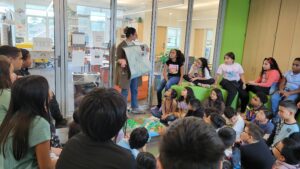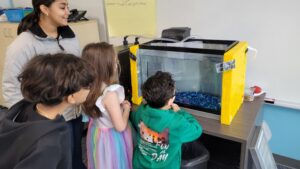
The Woonasquatucket River Watershed Council (WRWC) is proud to collaborate with the Rhode Island Department of Environmental Management (RIDEM) to bring the “Fish in the Classroom” program to local students. This unique initiative was recently showcased at a national conference hosted by the Aquatic Resources Education Association (AREA) where WRWC’s Education Director, Amanda Peavey, co-presented alongside RIDEM to highlight the program’s impact and the vital role of partnerships in environmental education.


The AREA conference draws educators, biologists, and conservation professionals from around the country, all dedicated to advancing aquatic education, conservation, and stewardship. Peavey’s presentation emphasized how collaboration between WRWC and RIDEM has not only created a robust STEAM-focused curriculum but has also expanded educational access to communities that might otherwise lack these learning opportunities.
In the program, RIDEM provides schools with free fish and essential tank equipment, which WRWC supports through in-class and field trip programming. Students dive into the life of brook trout, a local fish species requiring careful environmental stewardship, especially in an era of changing water conditions. Through hands-on lessons, students learn about water pollution, fish anatomy, and river ecology. A field trip to release their raised trout into the Woonasquatucket River cements a meaningful connection to conservation and aquatic ecosystems.
Attendees at the AREA conference, including education professionals and resource managers, engaged in a lively Q&A, discussing the broader implications of programs like Fish in the Classroom. Peavey extended thanks to RIDEM’s Kim Sullivan, Aquatic Resource Education Coordinator, and Principal Fisheries Biologist, whose expertise and commitment to conservation have made this program possible.
Beyond this inspiring presentation, WRWC’s partnership with RIDEM showcases a model for engaging youth in hands-on science while fostering a sense of responsibility and care for aquatic environments. Together, RIDEM and WRWC are not only teaching students about fish but also instilling a lifelong commitment to preserving their environment—one brook trout at a time.
